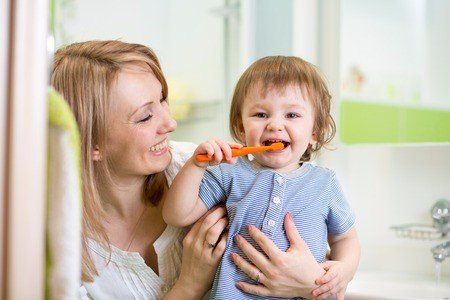Caring for Infant Oral Health
It’s essential for parents to remain
informed regarding oral care for infants. Despite a child’s primary teeth being
only temporary, children can still experience tooth decay and other infections.
Understanding the proper approach can help a child’s development and make it
easier for parents to provide him or her with the best possible oral health
care.
During Pregnancy
Per the American Academy of Pediatrics,
mothers can transfer bacteria to their children. “Streptococcus mutans” is a
disease-causing bacterium that can lead to dental decay in infants. Also, subpar
nutritional habits can grow bacterial production and further a mother’s risk of
transferring bacteria and jeopardizing oral health. The CDC also notes decay can
lead to cavities, which can be avoided if mothers take the correct steps during
every stage.
To ensure children have healthy teeth, mothers
should try to schedule dental exams and cleanings in at least their pregnancy’s
second trimester. Basic care and cleaning are safe for the child and reduces a
mother’s risk of transmitting bacteria while she’s carrying. It’s best to avoid
cosmetic procedures before giving birth and to limit any emergency procedures
if at all possible.
Infant Care
Parents should find a pediatric dentist they
like and can trust to provide quality care for the next few years. Schedule the
baby’s first dental appointment within the first year or at least when the
child’s first tooth appears. The goals of the first dental visit are to gain an
idea of what additional steps need to be taken for proper care. Also, most pediatric
dentists suggest parents make appointments in their child’s first five years every
six months.
During children’s first year, parents
should clean their gums twice per day between feedings. This helps prevent food
and bacteria buildup. The ideal technique is the parent wrapping a moist, clean
gauze around a clean pointer finger and lightly wiping the child’s gums. Once
teething starts, brush their teeth with a gentle paste using a soft bristle
toothbrush. As they get older, keep an eye out for easy-grasp brushes that will
help them get used to their brushing technique.
Be Cautious
Parents should avoid overexposing their
baby to fluoride in toothpaste and bottled water. They should also consult with
their dentist about fluoride use regarding their infant. To avoid further
bacteria buildup, parents shouldn’t let their child fall asleep with a bottle still
in his or her mouth. Parents should also try to avoid sharing too many eating
utensils if they’re concerned about transferring bacteria.
Following these steps can guarantee a
newborn has not only the most effective oral care but also the safest. And that
should give all parents some peace of mind in the hectic first year
of their child’s life.
Worried about the high costs of dental care?
Consider signing up for our family discount dental plan
that can save you as
much as 20 percent off your bills! For more information, click here.











